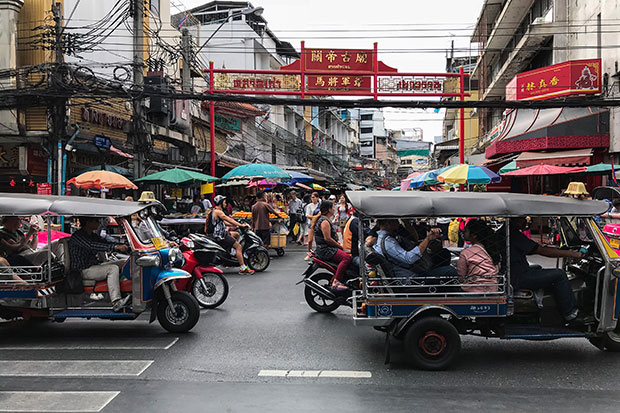BANGKOK, Aug 17 — Yaowarat, the biggest Chinatown in Thailand, is a haven for Chinese delicacies such as the famous kway chap at Nai-Ek (also popular for their moo krob or crispy pork belly) as well as numerous Chinese medicinal shops selling dried fish maw, ginseng, bird’s nest and more.
But the neighbourhood, located along Yaowarat Road and its surrounding streets such as Charoen Krung Road and Phat Sai, is also beloved by locals for its plethora of Thai Chinese desserts. Many might be familiar, albeit with a Thai touch which beckons a closer look... and tasting, of course.

Begin with Tae Lao Chin Seng, an old-school Teochew confectionery in the heart of Chinatown. This fourth-generation biscuit shop is the largest of its kind in Thailand and offers a variety of authentic Teochew biscuits and cakes.
Everything is still made by hand — from the classic tau sar piah filled with mung bean paste, shallots and white sesame, to chewy maltose crisps full of crunchy peanuts and fragrant sesame seeds. Regulars drop by to buy boxes of biscuits by the dozens.
And what better place to source traditional cakes for special occasions — from cakes for Thai Chinese weddings to golden moon cakes to celebrate the Mid-Autumn Festival. No snow skin moon cakes, I’m afraid; nostalgia trumps the new every time here.

The Teochews aren’t the only Chinese clan represented in Yaowarat. The Bangkokian Chinatown is also home to a large Cantonese community. Liong cha or herbal tea is one of many cultural imports brought over to Thailand by Cantonese migrants from Guangdong, so you’d find many shops here selling the traditional beverage.
Perhaps the most popular shop is Nam Tao Thong along busy Charoen Krung Road. Here you’d spot many a motosai rider dropping by for a quick cup of liong cha to eliminate heat from their bodies, then rush off to find their next passenger.

The shop is popular with tourists too, especially those from the Chinese diaspora who recognise the “fire” quenching properties of various herbal teas. Unlike some shops where signages are only in Thai, here each herbal tea is labelled in Chinese with helpful lists of their different benefits.
If you speak Cantonese, why not try chatting with the owners and learn a bit more about life here in Chinatown. One thing that might surprise you (or not, depending on your own experiences) is how the Thai Chinese in Yaowarat always identify themselves as Thai first and Thai Chinese second. It’s inspiring to see how well a culture has assimilated harmoniously with another.
You might be surprised by one of the local shops which carries the name of a neighbouring country. Singapore Potchana is a shop selling lod chong, the Thai version of cendol. These green “worms” are in fact strands of tapioca flour noodles; they get their vibrant colour from an infusion of pandan leaves.

Cendol is found all over South-east Asia, of course, from Malaysia to Indonesia. Here, the moniker “Singapore” refers to the location of the original vendor next to the former Singapore Theatre; potchana simply means “coffee shop” in Thai.
The Yaowarat version of lod chong comes in tall glasses of creamy coconut milk, topped with plenty of shaved ice to ward off the heat. The strands of lod chong have more of a chew compared to our Malaysian cendol, and tastes very sweet – as do most Thai desserts, so no surprises there.
For something less traditional, head to the Deksomboon showroom located next to the aforementioned Nai-Ek. Deksomboon is a well known brand of soy sauce in Thailand, a condiment you’d find in many a local household. Its mascot, a ruby-cheeked little cherub, has a tinge of Astro Boy, making it immediately recognisable. But aren’t we here for desserts though?

Well, we’re still in the right place. Besides the ubiquitous bottles of soy sauce and oyster sauce, this flagship Deksomboon shop also offers soft serve ice cream. The catch? It’s flavoured with — what else? — soy sauce!
Despite the odd sounding sweet and savoury pairing, the dark soy sauce (itself both savoury and sweet — basically what Thais use as a condiment for their khao mun kai or chicken rice) work really well here. The creamy soft serve is elevated by the salty and nutty notes of the caramel-like soy sauce. Its aroma is unmistakable though; this is definitely soy sauce!
There is also a plum sorbet for those who prefer a non-dairy option; the tangy plum sauce is particularly refreshing after a hot day of walking around Yaowarat. How’s that for a sweet ending to a day of exploring Bangkok’s Chinatown?
Tae Lao Chin Seng
4 Soi Yawaphanit, Yaowarat, Bangkok, Thailand
Open daily 9am-5pm
Nam Tao Thong
670 Charoen Krung Rd, Bangkok, Thailand
Open daily 8am-10pm
Singapore Potchana
680-682 Charoen Krung Rd, Bangkok, Thailand
Open daily (except Thu closed) 10:30am-9:30pm
Deksomboon
426 Yaowarat Rd, Bangkok, Thailand
Open daily 10am-10pm






















